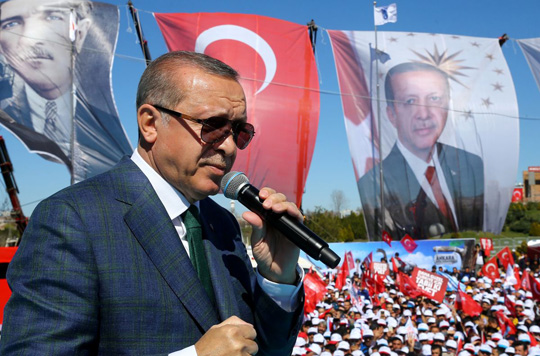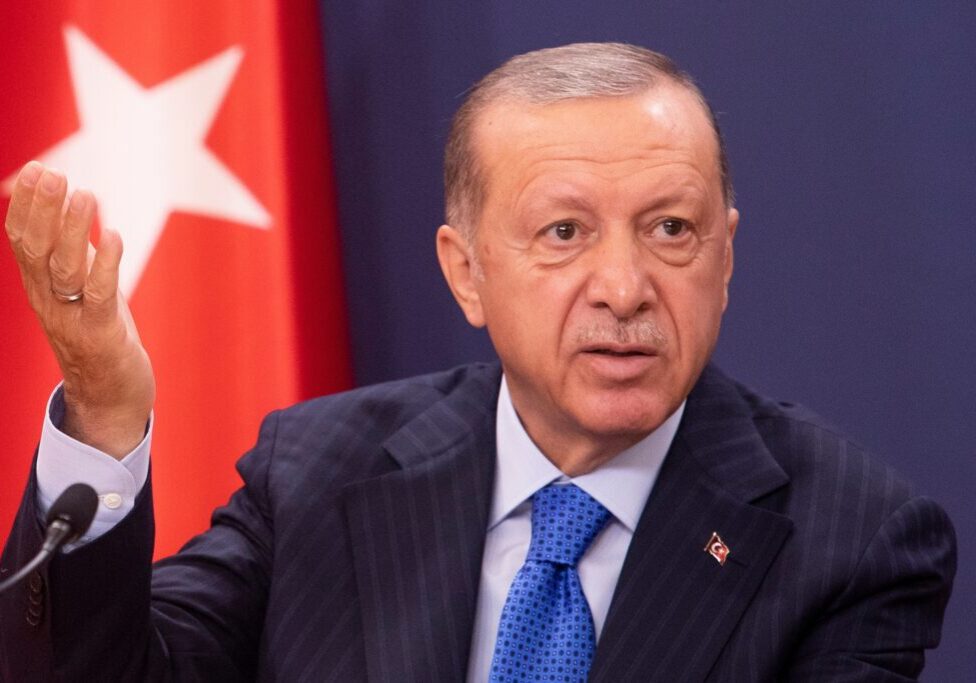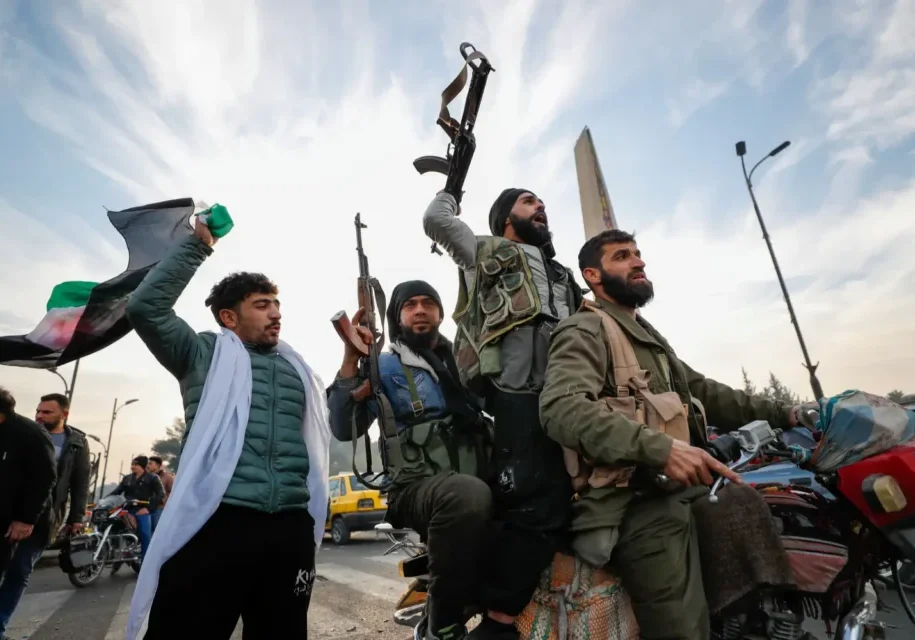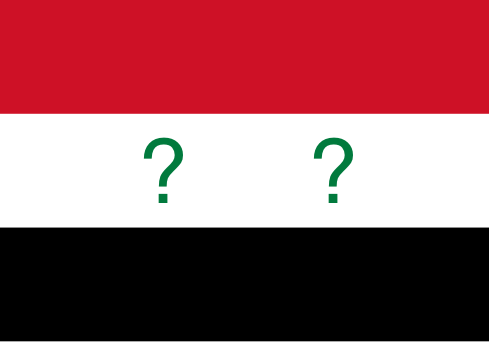Australia/Israel Review
The 14-Year Revolution
May 3, 2017 | Amotz Asa-El

Erdogan’s new, authoritarian Turkey
Amotz Asa-El
Speaking from the depths of the 1,150-room palace he inhabits, Recep Tayyip Erdogan soothed a Turkish TV interviewer that he had no intentions of becoming an Ottoman-style sultan. “I want to be like Queen Elizabeth,” he said.
That was in 2015. Now, following a referendum fraught with national, religious, regional, and global implications, his wish has been more than fulfilled – providing the Queen Elizabeth he was referring to was the 16th century Tudor monarch Elizabeth I, rather than the current British queen. If anything, the Turkish president’s authority is today set to measure somewhere between Oliver Cromwell’s and Henry VIII’s.
Though won narrowly and obtained dubiously, Erdogan’s victory cancels the position of prime minister and transfers executive power to the president, allowing him to personally appoint generals, ministers, judges, rectors, deans, ambassadors, and practically anyone else who matters, and to issue decrees that parliament will be able to cancel only by absolute majority. Moreover, budget management will be the president’s province, and parliament will lack any effective way to challenge his appointments.
Civic opposition is not dead. Erdogan’s opponents won 49% of the vote in the plebiscite despite an increasingly state-controlled media shutting off their access to airtime, and despite facing dirty tricks like police calling off anti-Erdogan assemblies due to “security threats.” There have also been allegations of foul play involving more than a million pro-Erdogan votes in the referendum.
Even so, Erdogan is now for Turkey what Franco was for Spain. The republic that was established by Kemal Ataturk in 1922 on the ruins of the Ottoman Empire has come a long way since Erdogan’s rise to power in March 2003. Indeed, an ever-thickening, 14-year plot now seems to have been but the prelude to a new era in Turkish history.
Erodgan’s procession from democracy to authoritarianism appears to have been a political work of art.
Having learned the lessons of Iran’s revolution, which immediately antagonised the West by attacking it verbally and purging the deposed Shah’s generals, colonels, judges, ministers, lawmakers and mayors, Erdogan started off by leaving the previous system intact and focusing on the economy.
The economically-trained Erdogan understood the need to foster fiscal balance while encouraging the private sector by attracting foreign investments and cutting taxes.
The result was a decade of breakneck growth, new jobs, and massive public works, while inflation fell from 28% to 13%, foreign debt declined to levels lower than many major developed economies, and a general sense of prosperity and pride descended on Turkish society.
Then, with his image of a responsible democrat consolidated, Erdogan turned on the military, ostensibly in the name of democracy. Western governments recalled the Turkish army’s coups over the decades, and took at face value Erdogan’s rhetoric about replacing generals in democracy’s defence. It was a clever way to put Western critics to sleep while slowly and surreptitiously laying siege to the secular republic’s institutions.
The arrests and indictments early this decade of senior military brass, including former armed forces Chief-of-Staff General Ilker Basbug, later proved to have been but the beginning of a multipronged assault that was likely premeditated from the outset. Back in 2012, however, the coup allegations that served as a pretext to replace the High Command were taken by many in the West not as part of a strategic takeover, but as a response to circumstances.
Suspicions of a great autocratic offensive grew the following year, when Erdogan used grassroots environmental protests in order to do to the judiciary and national police what he had previously done to the military. The authoritarian assault then spread to the media, highlighted by the arrests of senior newspaper editors on bizarre suspicions of espionage.
Meanwhile, the irresponsibility and cost of Erdogan’s one-man rule became manifest when he responded to an electoral setback by abruptly ending the peace process with the Kurdish minority, and waging a war that soon touched off a bloody terror campaign.
And then came last year’s attempted coup, which gave Erdogan pretext to launch a massive attack on any institution or individual that might rival him – including academia, where 7,317 professors and researchers lost their jobs, as did 4,272 judges and prosecutors and 170 generals, while 160 news organisations, including 16 TV stations and 45 newspapers, were shuttered. With more than 47,155 people jailed since the coup attempt and 113,260 additional people detained and more than 135,000 people having lost their jobs, according to Turkish Interior Minister Suleyman Soylu, it is the most thorough purge the world has seen since the end of the Cold War.
The referendum, then, caps a grand reversal of Turkey’s democratic achievements, and the repercussions transcend the Anatolian peninsula.
The Islamist Erdogan initially raised hopes he would inspire freedom’s march across the Muslim world. Those hopes have now been dashed.
Admittedly, the Turkish republic was never a Jeffersonian democracy, and during Ataturk’s years it wasn’t a democracy at all. The military’s supervision of the politicians, as etched in the constitution he bequeathed, was antithetical to democracy’s spirit and letter. Yet the republic he crafted was staunchly secular.
Ataturk shut down Islamic religious schools, banned Islamic attire, opened higher education to women, replaced the Arabic script with Latin, and substituted Muslim legal codes with Swiss, Italian and German laws. Erdogan reopened Islamic academies, banned abortions, legitimised women’s Muslim headscarves like his own wife’s, and struck alliances with Islamists like Egypt’s Muslim Brotherhood and Gaza’s Hamas.
There were times when such a change of course could be dismissed as Turkey’s internal affair. But Erdogan descended on the international system 18 months after the September 11 attacks. His response to the unfolding clash between the West and Islamism was alarming from the outset. When the US requested permission to invade Iraq from Turkish soil, Erdogan blocked his NATO ally’s plan by bringing the issue to his parliament, where he concocted a rejection of the American plea.
Sixteen years after 9/11 the jury is still out concerning Erdogan’s usefulness as a warrior in the global war on Islamism. The bloody attacks his country has come to face from ISIS have forced him to take on that particular group, but whether he rejects the abstract quest for global Islamic domination remains unclear.
Ataturk set out to reverse the Middle Eastern focus of the Ottoman Empire, and told his country to look to Europe instead, and to do so with a neighbour’s admiration rather than with a rival’s hostility. Erdogan’s departure from this script became blunt when he compared Dutch and German leaders to Nazis, after his request to campaign among Turkish expatriate communities was turned down.
More broadly, in embracing authoritarianism and unleashing his purge, Erdogan has consciously turned his back on the European Union, whose constitution requires that member states be fully democratic.
In a proverbial throwback to distant history, Austria has emerged as the leading anti-Turkish voice in the EU, now demanding the formal cancelation of Ankara’s candidacy for membership. The Austrian attitude echoes memories of the failed Siege of Vienna in 1683, a trauma for Europeans and the beginning of the Ottoman retreat from Europe that ended in World War I.
The grand Ottoman retreat was eventually followed by a new Turkish-European harmony. Now that harmony appears over.
The place where the impact of Erdogan’s Revolution will be weakest is, paradoxically, the Middle East.
While still prime minister, Erdogan locked horns with Syrian President Bashar al-Assad, whom he accused of committing genocide, and with Egyptian President Abdel Fatah el-Sisi, whose government he called illegitimate due to its overthrow of the democratically-elected Mohamed Morsi.
Yet the super-empowered Erdogan emerges at a time when such regional meddling is less tempting than it was in his more democratic years.
Assad’s survival of the revolt he faced; the influx of nearly 3 million Syrian refugees into Turkey; and the resurgence of violence in the Kurdish east make foreign-meddling a luxury Erdogan cannot afford. The Turkish strongman demonstrated he understood this last year, when he parted ways with then-Prime Minister Ahmet Davutoglu, who advocated a Turkish return to the Middle East as its neo-Ottoman economic unifier.
Erdogan has since learned that Arab leaders are not interested in Turkey’s leadership any more than the EU is interested in its membership. Worse yet, the region proved to be fraught with dangers that demand Turkish estrangement rather than engagement.
That is why Erdogan has built a wall along Turkey’s border with Syria; that is why he is cultivating cooperation with Russia after having previously provoked Moscow; and that is why he has also restored diplomatic ties with Israel, after having previously severed them in the wake of the Mavi Marmara Flotilla crisis in 2010. Fortifying Turkey, fending off Syrian refugees, accommodating Moscow as its jets park in his backyard, and buying Israel’s newly found Mediterranean gas appear to be more important to Erdogan than regional domination, at least for the time being, despite his new powers.
Erdogan now seems also ready to grudgingly accept Assad’s survival. Jointly containing the Kurds on both sides of the Syrian-Turkish border is now more urgent for him, and also more practical, than shaping the next government in conflict-ridden Syria.
Regionally, then, the autocratic Erdogan could actually emerge as a stabiliser of sorts. Globally, however, the demise of Turkish democracy casts a shadow on the entire post-Cold War world order.
What during the 1990s seemed like a rapidly and irreversibly democratising world has since been challenged by an economically-resurgent China and an imperially-resurgent Russia. Now this non-democratic pair is joined by an authoritarian Turkey. Freedom’s global march looks not only to have halted, but, to a significant extent, reversed.
This trend will be helped along by recent events within the West.
Europe’s creeping fragmentation weakens its effectiveness as a campaigner for democracy, and also its attractiveness as a guarantor of its members’ prosperity. The rise of Donald Trump eases international pressure on autocrats like Erdogan, provided they don’t do anything extremely stupid, like gassing their people, the way Assad just did, before his jets met with the American Navy’s Tomahawk missiles.
Trump’s attitude to Erdogan seems to be the same as Ronald Reagan’s to Chilean dictator Augusto Pinochet. Trump, who telephoned Erdogan to congratulate him after his victory in the referendum, is evidently ready to turn a blind eye to Erdogan’s domestic conduct provided he stands by the US in the global arena.
It follows that Erdogan’s fall from power, should it ever happen, will not be the doing of foreigners. Only the Turkish public which brought him to power, then let him castrate civil society, and now watches him complete the transition to dictatorship, can ever hope to undo the 14-year revolution that Erdogan has delivered, and totalitarian era he is now set to unleash.
Tags: Turkey






